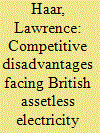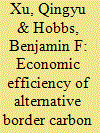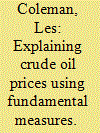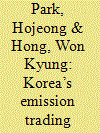|
|
|
Sort Order |
|
|
|
Items / Page
|
|
|
|
|
|
|
| Srl | Item |
| 1 |
ID:
090083


|
|
|
|
|
| Publication |
2009.
|
| Summary/Abstract |
Market efficiency is analysed for the Iberian Power Futures Market and other European Power Markets, as well as other fuel markets through evaluation of ex-post Forward Risk Premium. The equilibrium price from compulsory call auctions for distribution companies within the framework of the Iberian Power Futures Market is not optimal for remuneration purposes as it seems to be slightly upward biased. In the period considered (August 2006-July 2008), monthly futures contracts behave similarly to quarterly contracts. Average risk premia have been positive in power and natural gas markets but negative in oil and coal markets. Different hypotheses are tested regarding increasing volatility with maturity and regarding Forward Risk Premium variations (decreasing with variance of spot prices during delivery period and increasing with skewness of spot prices during delivery period). Enlarged data sets are recommended for stronger test results. Energy markets tend to show limited levels of market efficiency. Regarding the emerging Iberian Power Futures Market, price efficiency is improved with market development of all the coexistent forward contracting mechanisms and with further integration of European Regional Electricity Markets.
|
|
|
|
|
|
|
|
|
|
|
|
|
|
|
|
| 2 |
ID:
180122


|
|
|
|
|
| Summary/Abstract |
From the outset of deregulation and privatisation of UK electricity markets, the desired extent of vertical integration has been debated. Concerns over the dominance of the “Big Six” majors and whether consumers were receiving a fair deal, led the new Government of 2010 to promote the entry of new retail supply firms without generation assets. Increasing consumer choice and facilitating supplier switching were seen as counter-weights to the dominance of the vertically integrated majors. Through various policies favouring new, assetless suppliers, the domestic retail electricity market in the UK has become less concentrated offering more choice to consumers. But the process of reducing market concentration has had setbacks: many new retail suppliers went bankrupt and service quality has been mixed. To address possible short-comings, the Regulator in mid-2019 introduced stricter requirements for a retail supply license but are they sufficient? Combining theory with empirical analysis, it is argued that enhanced requirements are unlikely to be sufficient to ensure the success of these new firms because assetless retailers face competitive disadvantages under the current market structure. Before debating the role and benefits of such firms, their economic viability should be assessed.
|
|
|
|
|
|
|
|
|
|
|
|
|
|
|
|
| 3 |
ID:
179729


|
|
|
|
|
| Summary/Abstract |
To be effective, policies addressing power sector carbon emissions in jurisdictions that are embedded in larger carbon markets must account for carbon embodied in imports and the potential for leakage. Yet analyses of alternative border carbon adjustment (BCA) policies that carefully model the impact of generation mix, net load distributions, and transmission limits are rare in the literature. With a generation-transmission expansion planning model of Western North America, we compare the impacts of alternative BCA schemes that California's carbon pricing system could implement. These include no BCA, facility (import source)-based deemed emission rate, a facility-neutral and constant (over-time) rate, and a facility-neutral and dynamic rate. Our results suggest that, when compared to no BCA or BCA using facility-based deemed rates, a facility-neutral BCA can improve efficiency by simultaneously lowering market-wide emissions and costs without raising California consumer expenditures. Emissions leakage also declines significantly. The precise value of the deemed rate affects these gains; setting it equal to marginal emission rates external to California is most efficient. We also show that California's carbon pricing encourages more interstate transmission expansion because power imports become more profitable. However, BCAs that cost-effectively lower total regional emissions will dampen those incentives.
|
|
|
|
|
|
|
|
|
|
|
|
|
|
|
|
| 4 |
ID:
111343


|
|
|
|
|
| Publication |
2012.
|
| Summary/Abstract |
The role of crude oil as the main energy source for the global economic activity has motivated the discussion about the dynamics and causes of crude oil price changes. An accurate understanding of the issue should provide important guidelines for the design of optimal policies and government budget planning. Using daily data for WTI over the period January 1986-March 2011, we analyze the evolution of the informational complexity and efficiency for the crude oil market through multiscale entropy analysis. The results indicated that the crude oil market is informationally efficient over the scrutinized period except for two periods that correspond to the early 1990s and late 2000s US recessions. Overall, the results showed that deregulation has improved the operation of the market in the sense of making returns less predictable. On the other hand, there is some evidence that the probability of having a severe US economic recession increases as the informational efficiency decreases, which indicates that returns from crude oil markets are less uncertain during economic downturns.
|
|
|
|
|
|
|
|
|
|
|
|
|
|
|
|
| 5 |
ID:
092570


|
|
|
|
|
| Publication |
2009.
|
| Summary/Abstract |
This study examines the random walk hypothesis for the crude oil markets, using daily data over the period 1982-2008. The weak-form efficient market hypothesis for two crude oil markets (UK Brent and US West Texas Intermediate) is tested with non-parametric variance ratio tests developed by [Wright J.H., 2000. Alternative variance-ratio tests using ranks and signs. Journal of Business and Economic Statistics, 18, 1-9] and [Belaire-Franch J. and Contreras D., 2004. Ranks and signs-based multiple variance ratio tests. Working paper, Department of Economic Analysis, University of Valencia] as well as the wild-bootstrap variance ratio tests suggested by [Kim, J.H., 2006. Wild bootstrapping variance ratio tests. Economics Letters, 92, 38-43]. We find that the Brent crude oil market is weak-form efficiency while the WTI crude oil market seems to be inefficiency on the 1994-2008 sub-period, suggesting that the deregulation have not improved the efficiency on the WTI crude oil market in the sense of making returns less predictable.
|
|
|
|
|
|
|
|
|
|
|
|
|
|
|
|
| 6 |
ID:
126622


|
|
|
|
|
| Publication |
2013.
|
| Summary/Abstract |
District heating pricing is a core element in reforming the heating market. Existing district heating pricing methods, such as the cost-plus pricing method and the conventional marginal-cost pricing method, cannot simultaneously provide both high efficiency and sufficient investment cost return. To solve this problem, the paper presents a new pricing model, namely Equivalent Marginal Cost Pricing (EMCP) model, which is based on the EVE pricing theory and the unique characteristics of heat products and district heating. The EMCP model uses exergy as the measurement of heating product value and places products from different district heating regions into the same competition platform. In the proposed model, the return on investment cost is closely related to the quoted cost, and within the limitations of the Heating Capacity Cost Reference and the maximum compensated shadow capacity cost, both lower and higher price speculations of heat producers are restricted. Simulation results show that the model can guide heat producers to bid according to their production costs and to provide reasonable returns on investment, which contributes to stimulate the role of price leverage and to promote the optimal allocation of heat resources.
|
|
|
|
|
|
|
|
|
|
|
|
|
|
|
|
| 7 |
ID:
111085


|
|
|
|
|
| Publication |
2012.
|
| Summary/Abstract |
Oil is the world's most important commodity, and improving the understanding of drivers of its price is a longstanding research objective. This article analyses real oil prices during 1984-2007 using a monthly dataset of fundamental and market parameters that cover financial markets, global economic growth, demand and supply of oil, and geopolitical measures. The innovation is to incorporate proxies for speculative and terrorist activity and dummies for major industry events, and quantify price impacts of each. New findings are positive links between oil prices and speculative activity, bond yields, an interaction term incorporating OPEC market share and OECD import dependence, and the number of US troops and frequency of terrorist attacks in the Middle East. Shocks also prove significant with a $6-18 per barrel impact on price for several months.
|
|
|
|
|
|
|
|
|
|
|
|
|
|
|
|
| 8 |
ID:
151688


|
|
|
|
|
| Summary/Abstract |
In recent years, terrorist organizations have made considerable progress in their operations and in the technology they employ by using unguided rockets. Such developments are amplified in the case of Israel, where they pose a clear and present danger to the country’s population centers. This article examines how the firing of unguided rockets at Israel impacts the capital market and whether such impact is permanent or transitory. Having examined firing events based on categorical characteristics of the Terror Index, the article detects a negative correlation between the severity of the event, the range of the trajectories, the number of fatalities and wounded, and index returns. Similarly, it was observed that only in the events accompanied by low rocket-firing rates were the capital markets permanently affected.
|
|
|
|
|
|
|
|
|
|
|
|
|
|
|
|
| 9 |
ID:
119807


|
|
|
|
|
| Publication |
2013.
|
| Summary/Abstract |
This study examines whether the spot prices in the Japan Electric Power Exchange are efficiently formed from April 3, 2006, to March 31, 2012, using the conventional and rank-based variance-ratio tests. The results seem to reject the efficient market hypothesis in the market. Moreover, by applying Granger-causality tests, this paper investigates whether the power price is determined from the information of primary energy and exchange markets that directly affect the cost of power generation. The results indicate no Granger-causality from the prices of oil and gas and the exchange rate to the price of electricity. Finally, this paper discusses the factors that lead to inefficient and mysterious price formation.
|
|
|
|
|
|
|
|
|
|
|
|
|
|
|
|
| 10 |
ID:
122071


|
|
|
|
|
| Publication |
2013.
|
| Summary/Abstract |
The phenomenon of mergers and acquisitions is an ancient one, yet it has gained considerable momentum in recent years. It has also taken root in Israel as local companies utilize mergers as a strategic means for promoting growth and efficiency. The information granted to investors undergoes three main events: rumour of the merger, the declaration of the merger, and its execution. In this article, the merger phenomena in the Israeli market are examined from a different angle. This research attempts to characterize each event using two approaches: in the first, the differences in abnormal returns between the different stages are examined, for both acquiring and target firms. In the second assessment, the dependence of abnormal returns on the number of days between declaration and execution is examined, for both types of firms. The results of the first approach revealed that acquiring companies face negative abnormal returns, while target companies face positive abnormal returns during the days of the events. The second approach exposed a certain investor predilection for different time ranges - i.e. investors favour mergers that are executed in the medium and long term, as opposed to short-term mergers.
|
|
|
|
|
|
|
|
|
|
|
|
|
|
|
|
| 11 |
ID:
136194


|
|
|
|
|
| Summary/Abstract |
In 2008, the government of Republic of Korea (Korea) announced the national abatement target aiming at 30% reductions from the Business-as-Usual projections by 2020. Accordingly, the Emission Trading Scheme (ETS) will be implemented from 2015 onwards. As ETS performance substantially depends on the structural design, it is critically important to examine the details of Korean ETS for the achievement of cost effectiveness and concurrent development of an active emission trading market. This paper addresses several policy design issues for this purpose. After providing an overview on the current framework of Korean ETS, we propose ways to achieve flexibility, consistency and market efficiency of the program in consideration of the preexisting policies. Issues in policy design are discussed by focusing on allowance allocation, market stabilization measures and price mechanism in the emission and energy markets in Korea. This paper will serve as a practical guideline for establishing sustainable and market-efficient Korean ETS that can be compatible with the international standards as in the EU ETS.
|
|
|
|
|
|
|
|
|
|
|
|
|
|
|
|
| 12 |
ID:
094932


|
|
|
|
|
| Publication |
2010.
|
| Summary/Abstract |
After deregulation of the energy market in Norway, a number of mergers and acquisitions of hydropower generating companies have taken place. However, valuation of these companies has proved controversial. From an ex-post perspective, there is support for the criticism that generation assets have been sold too cheaply. This article presents a simple valuation model providing evidence of how value has evolved. On the basis of these results, we discuss the valuation from an ex ante perspective and in the light of the market efficiency hypothesis of (Fama, 1970) and (Fama, 1991).
|
|
|
|
|
|
|
|
|
|
|
|
|
|
|
|
| 13 |
ID:
124677


|
|
|
|
|
| Publication |
2013.
|
| Summary/Abstract |
In this paper, we study the relationship between futures and spot prices in the European carbon markets from the cost-of-carry hypothesis. The aim is to investigate the extent of efficiency market. The three main European markets (BlueNext, EEX and ECX) are analyzed during Phase II, covering the period from March 13, 2009 to January, 17, 2012. Futures contracts are found to be cointegrated with spot prices and interest rates for several maturities in the three CO2 markets. Results are similar when structural breaks are taken into account. According to individual and joint tests, the cost-of-carry model is rejected for all maturities and CO2 markets, implying that neither contract is priced according to the cost-of-carry model. The absence of the cost-of-carry relationship can be interpreted as an indicator of market inefficiency and may bring arbitrage opportunities in the CO2 market.
|
|
|
|
|
|
|
|
|
|
|
|
|
|
|
|
| 14 |
ID:
118852


|
|
|
|
|
| Publication |
2013.
|
| Summary/Abstract |
I examine in the period 2008-2011 the efficiency of four carbon dioxide (CO2) emission allowance futures traded in the Intercontinental Exchange (ICE). To this end, I assess the profitability of trading strategies based on simple technical analysis rules and naïve forecasts. The results from 2010 onwards are consistent with weak market efficiency. In turn, this finding suggests that the European carbon market is gradually attaining a state of maturity.
|
|
|
|
|
|
|
|
|
|
|
|
|
|
|
|
| 15 |
ID:
090077


|
|
|
|
|
| Publication |
2009.
|
| Summary/Abstract |
The present paper provides an empirical assessment of the effects associated with the reorganization of minute reserve markets in Germany. As the aim of the regulator is to assure a competitive market with transparent pricing, we analyze whether the recent policy reform has had an impact on the dynamics of minute reserve prices. Our results show that the level and volatility of positive and negative minute reserve prices decreased substantially. Furthermore, we provide evidence that the degree of integration between reserve and spot markets has increased. Overall, prices reacted to the policy change in a manner that is in line with the regulator's objective. The reform can thus be viewed as a step towards an efficient reserve market.
|
|
|
|
|
|
|
|
|
|
|
|
|
|
|
|
| 16 |
ID:
169901


|
|
|
|
|
| Summary/Abstract |
Russian government sanctioned the first gas trade at the Saint-Petersburg International Mercantile Exchange (SPIMEX) in 2012 as a part of the gas industry national strategy.
|
|
|
|
|
|
|
|
|
|
|
|
|
|
|
|
| 17 |
ID:
149864


|
|
|
|
|
| Summary/Abstract |
This paper studies the relation between the trading activity of market participants and the volatility of the European Emission Allowance price during Phase I of the European Union Emission Trading System (EU ETS). We focus on the contrasting roles of different trader types.
|
|
|
|
|
|
|
|
|
|
|
|
|
|
|
|
|
|
|
|
|